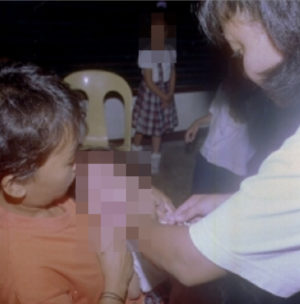Most Filipinos no longer agree with vaccinations

Only 32% of Filipinos think that vaccination is important.
Only 32% of Filipinos strongly agree that vaccines are important, a recent study conducted by the World Health Organization (WHO) after the controversy of the dengue vaccine “Dengvaxia” emerged in 2017, showed.
WHO Expanded Programme on Immunization (EPI) communication officer Jun Ryan Orbina said this is very low compared to the 93% rate reflected in their survey in 2015.
The study was conducted on August 31, 2018 entitled “Vaccine confidence plummets in the Philippines following dengue vaccine scare: why it matters to pandemic preparedness” by The Vaccine Confidence Project and London School of Hygiene and Tropical Medicine.
The study also showed that only 21% of Filipinos strongly agree that vaccines are safe while about 22% are confident about the effectiveness of vaccines, which is also very low, compared to the 82% confidence rate shown in both topics in 2015.
According to Orbina, the vaccine hesitancy situation in the Philippines could lead to a rise in cases of vaccine-preventable diseases (VPDs).
“The reported measles cases in the Philippines have increased to 367% this year compared to last year,” Orbina said.
Orbina said that the Epidemiology Bureau of the Department of Health (DOH) has already recorded 17,298 cases of measles from January to November this year, which is very much higher compared to the 3,706 cases reported for the same period last year.
In their assessment of perception report on immunization, Orbina said parents became afraid to submit their children to the immunization programs of DOH, due to the dengvaxia scare in 2017.
Cebu was one of the recipients of the dengue immunization program in the middle of 2017, wherein more than 150,000 children, ages 9 to 14 years old, were vaccinated.
DOH-7 officials have assured the public that their vaccines are safe and proven effective.
WHO urged DOH to embark on a program that would recover the public’s trust in immunization and to consistently inform the public that the dengue vaccine issue and routine immunization are two different issues, through focusing on core strategies of listening and engagement.
“DOH and health partners need to clarify the dengue vaccine narrative,” he added.
Health workers, who remain as the most trusted information sources, should also be well-versed in discussing the issue.
“What we can do for now is consistent messaging for precaution advocacy for vaccine preventable diseases,” he said.
Disclaimer: The comments uploaded on this site do not necessarily represent or reflect the views of management and owner of Cebudailynews. We reserve the right to exclude comments that we deem to be inconsistent with our editorial standards.
